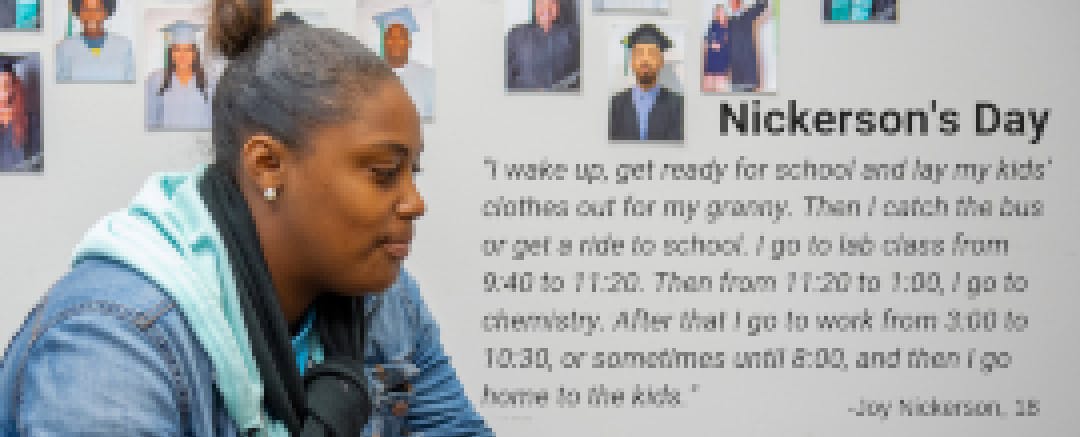NEW ORLEANS — Photos of students in silver-blue caps and gowns line the walls of Elizabeth Ostberg’s office. There must be over a hundred of them, faces beaming and proud.
Graduation is a momentous occasion for any student, but for those who come through the NET Charter High School, it carries extra meaning.
Students at the NET have come a long way to earn their diplomas. Most either dropped out, failed out or were expelled from previous programs before finding their way to this alternative school, which was founded by Ostberg eight years ago.
The school, which added a second campus last year, currently serves just over 300 students between ages 15 and 21. About half of the student population is affected by mental health issues. Over one-third struggle with substance abuse. A quarter are involved in the judicial system. Forty percent are either homeless or have an unstable housing situation. And about 20 percent are pregnant or parenting.
Joy Nickerson falls into that last category. She’s 18, but just barely: The mother of two had a birthday in early November.
By the turn of the calendar year, if all goes according to plan, an image of Nickerson in her own cap and gown will join the photos of NET alumni on that sacred wall in Ostberg’s office.

Establishing the Homebound Program
The NET is uniquely designed to help pregnant and postpartum students like Nickerson finish high school and be strong parents to their children throughout the process. The school achieves this mainly through its “homebound" program, which allows expecting and new mothers to blend online learning with one-on-one visits from a designated “homebound teacher" until they are able to resume normal classes.
Programs like this are important, especially in Louisiana, which has one of the highest rates of teen pregnancy in the country, according to the U.S. Department of Health and Human Services, and where state law mandates that sex education must emphasize abstinence and prohibits staff at the NET from providing contraceptives, such as condoms, to students.
In its first year of operation, in 2011, the NET enrolled 60 students, several of whom became pregnant or delivered babies that year.
Back then, there was no homebound program. But teachers in Louisiana were required to send schoolwork home to students on maternity leave, Ostberg says, so the NET leaned on its in-house counselor to run the work back and forth between students’ homes and the school.
“It was almost like getting make-up work when you’re sick,” Shane Colman, the operations director at the NET, tells EdSurge.
Over time, staff realized they needed to hire a teacher whose primary role was to visit and tutor students who were either on bed rest, maternity leave or were unable to come to campus for other health reasons.
When the school, which is under the purview of Orleans Parish School Board, secured enough grant funding, Ostberg hired an official homebound teacher and began exploring how technology could strengthen the program.
“The ultimate goal of homebound is that students don't drop out because of this event that's happened to them,” Colman explains. “We want them to feel like they're still connected to the school, like teachers know about them, they care about them, they're watching their grades. So when they're ready to come back, they don’t have to catch up.”
As of mid-November, seven students were on homebound at the NET, Ostberg says, but that number fluctuates year-round and ranges from three to eight students at a time.
A Traditional School’s Approach to Supporting Student Parents
Nickerson became pregnant with her first child, Mesiah, who is now 2 years old, when she was a sophomore enrolled in a preparatory school on the west side of New Orleans. At the prep school, she had some behavioral challenges. Nickerson says she used to get into a lot of fights. Sometimes, police had to get involved. But after she had a baby, that all changed.
“I was like ‘I have kids now,’ so I just humbled myself,” she explains. “I have things to live for and be free for. I don’t have time to go to prison.”
When she was seven months along, Nickerson says she was put on “strict bed rest,” and she stayed home from school until three months after delivering Mesiah.
“My mom used to drive up to the school and ask for my work so I could stay on track,” Nickerson recalls, “but when I went back to class, I still had packets and packets of work that I had to catch up on.”
She didn’t have any help learning the material, either. She would search for lessons on Google, watch YouTube videos and ask friends to recount what they had learned in class. As a result, her grades took a hit that year.
Becoming a new mother motivated Nickerson to stay out of trouble—she knew it was time for a change. She'd heard about the NET through her cousin, who is the receptionist at one of the campuses. She thought it sounded like a good fit and transferred in August 2017.
How the NET Approaches Learning
One of the differences that has been hugely helpful, Nickerson says, is the class size. Her previous school had about 30 students in each class, while the NET only enrolls about five to 15 students per class.
The school is designed to be flexible and individualized. Students sign up for three classes each semester, and since many of them work or have children to care for, classes run from 8 a.m. to 6:30 p.m. Some students take all their classes in the morning, while others go at night. Throughout their time at the NET, most students will engage in a combination of direct instruction, blended learning and online learning experiences. The staff build in flexibility and variety to balance the importance of building relationships with teachers, learning to use technology and meeting the students where they are.
“Alternative schools, historically, are based on this idea that you're trying to punish or fix kids, and then send them back into society. That's definitely not our goal,” says Ostberg, the executive director. “Our belief is that if you weren't successful in a traditional setting, then what you need is a different setting.”
“Everything is kind of built with this idea of ‘Who are you? What do you need? And how do we build that for you?’” she adds.

That’s how the NET approached Nickerson’s situation when she experienced complications with her second pregnancy.
Her younger son, Kevin, was born at 27 weeks, she says. At first, he seemed healthy, so Nickerson took a standard six-week maternity leave then returned to school.
But around the time of Kevin’s six-week checkup, he became extremely sick. His organs had not fully developed, and he began to lose weight rapidly.
Nickerson and her baby were readmitted to the hospital, and they didn’t leave for six months. She went back on homebound, and during that time, the NET’s homebound teacher visited the hospital two to three times a week to go over her latest assignments. In between visits, Nickerson used a school-provided Chromebook and hotspot to do her classwork online through Edgenuity, the NET’s online learning platform.
Nickerson tells EdSurge the NET’s support system was “way different” from her old school. “When I came back to school, I was still on the same page as all the rest of the students in my classes.”
After multiple surgeries, Kevin eventually turned a corner. He’s still small for a 1-year-old, Nickerson says, but he’s doing well. She returned to in-person classes in August.
Envisioning a Daycare at the NET
The homebound program was key in keeping Nickerson on track in school and even helping her graduate a full semester ahead of schedule. But she gets a lot of support at home from her mother and grandmother, who keep her boys during the day when she is at class, and afterward when she goes to her job at McDonald’s.

Without her family, she says: “I don't think I would've made it.”
Unfortunately, few student parents at the NET can say the same. Many have to scramble to find someone to watch their child so they can go to school. Professional childcare is costly, so some of the mothers get assistance from a state-run program. Others quit school altogether.
“Without adequate childcare, it’s hard to stabilize their situation,” Kim Legaux, the NET’s school counselor, explains. “That’s been our biggest issue.”
The NET’s board of directors realizes there is a significant need for the school to offer a daycare center.
During a board meeting on Nov. 14, members discussed two options: partnering with an existing daycare to launch the program in fall 2019 or building a new, in-house daycare center to launch in fall 2020.
Overall, the members agreed that offering a daycare in some form is a priority. “We still lose some kids because of childcare issues,” Ostberg says, “so it is high on our list of things to do.” But the NET serves students who need all kinds of extra support, so the school is forced to make tough decisions, she admits.
Until the NET can come up with a daycare solution, some student parents will have to put their graduation plans on hold. At least one, though, is already imagining what her graduation photo will look like on Ostberg’s wall, come December.
“I’m gonna be my mom’s first child to graduate high school,” says Nickerson, who is one of four. “And I just want to make her proud.”


